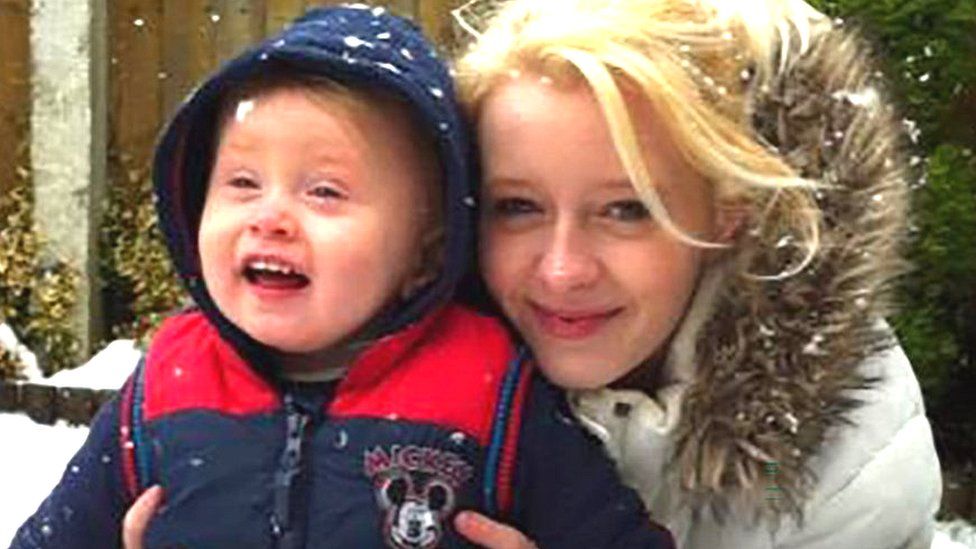Bethany Vincent and Darren Henson murders: 'Missed opportunities' to stop violent killer
- Published

Bethany Vincent and Darren Henson (pictured above in 2017) were found fatally stabbed in their home in Louth on 31 May 2021
There were missed opportunities to stop a violent man from murdering his ex-partner and her nine-year-old son, a report has found.
Bethany Vincent, 26, and Darren Henson, known as DJ, were stabbed to death by Daniel Boulton at their home in Louth, Lincolnshire, in May 2021.
A council review found Boulton's mental health needs were prioritised over the risk he posed to Ms Vincent and DJ.
The authority said it had taken action to address issues raised in the report.
Boulton was jailed for a minimum of 40 years at Lincoln Crown Court in February 2022 after he walked 28 miles (45km) from a homeless hostel in Skegness on 31 May 2021 to Ms Vincent's house on High Holme Road where he stabbed her nine times, before stabbing DJ 14 times in his bedroom.
Three years after the murders, Lincolnshire County Council has published a combined Child Safeguarding Practice Review and Domestic Homicide Review into their deaths.
Daniel Boulton is serving a 40-year jail term for the double murders
In the report, author Dr Russell Wate said the level of the killer's risk to Ms Vincent and her family was "underestimated throughout", which included signs of coercion and control, given his history of domestic abuse-related offences.
"What is unequivocal is that the lines of communication between agencies was not sufficient to fully understand the risks involved.
"Opportunities to have addressed a more thorough understanding of the perpetrator's risk towards Bethany and DJ became secondary to the perceptions of the needs of the mental health of the perpetrator and he manipulated this to his advantage."
He said "a considerable amount of time and effort" had gone towards towards supporting Boulton's needs and meant "Bethany's safeguarding needs became secondary".
Boulton walked 28 miles (45km) to High Holme Road in Louth where Bethany Vincent lived with her nine-year-old son DJ
Dr Wate criticised "a distinct lack of joined-up working in this case" and said threats and comments made by the perpetrator were "effectively disregarded".
"The exercise of coercion and control was not identified even though there were indicators of such behaviours. Those signs were missed, even though they were part of the evidence from Bethany in her witness statements.
"The fact that the perpetrator was repeatedly returning to Bethany's home was an obvious indicator of the escalation of the risk of harm. This escalation should have been identified."
He also said the killer's hatred of DJ was "a most concerning aspect that no agency acted to address".
Dr Wate said the report used the victims names instead of the customary pseudonyms following their family's wish for them to have "a voice" during the review.
"No words can adequately describe their loss and as a panel, our motivation is to ensure that this review delivers an open and holistic picture of who they both were and how the learning identified can contribute to protecting other victims in the future."
The review said agencies had to learn from the deaths of Bethany Vincent and Darren Henson
He made a series of recommendations "to co-ordinate the raising of professionals' awareness, knowledge and understanding" of domestic violence, risks of harassment and stalking following a separation and coercive and controlling behaviours.
In a statement, Martyn Parker of the Safer Lincolnshire Partnership, said: "This was a tragic incident, and our thoughts are with Bethany and Darren's family and friends at this difficult time.
"The review has helped identify some general learning points and local organisations have already taken action to address these.
"These steps will improve communication and information sharing between agencies and ensure everyone working with local families has a better understanding of issues such as domestic abuse and coercive and controlling behaviour.
"We hope that this can help reduce the likelihood of similar tragedies in future."
Follow BBC Lincolnshire on Facebook, external, X (formerly Twitter), external, and Instagram, external. Send your story ideas to eastyorkslincs.news@bbc.co.uk, external
- Published2 February 2022
- Published2 February 2022
- Published1 February 2022
- Published26 January 2022
- Published25 January 2022
- Published20 January 2022
- Published19 January 2022
- Published18 January 2022
- Published13 January 2022
- Published4 June 2021
- Published3 June 2021
- Published3 June 2021
- Published2 June 2021
- Published1 June 2021
- Published1 June 2021